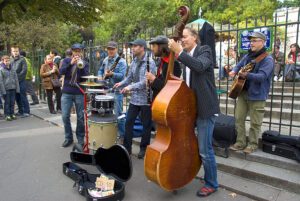All travelers should use these practical travel safety rules and avoid the painful travel scams outlined below.

The number of travelers across the globe has increased to near prepandemic levels. Unfortunately, too many have told me they have fallen victim to tourist scams. Some are old, some new, and some refreshed.
Stay safe. I have four absolute travel safety rules for all travelers, particularly if you’re traveling alone.
Providing trip information to friends, family, and the US State Department can facilitate traveler safety in emergencies.
1. Send your itinerary:
Email your itinerary to family and friends, or use TripIt! like me or similar applications to share it. This facilitates contacting you throughout your trip, even if cellphone contact fails. It will enable friends to help authorities if they believe you have encountered trouble. Also, just in case, load a password-protected itinerary on your cellphone and the cloud. Include a copy of your passport if traveling internationally.
2. US Nationals — STEP program registration for international travel:
International travelers should register in the Department of State’s Smart Traveler Enrollment Program, STEP. It’s a free service enabling registrants to receive timely, meaningful information about their destinations’ safety and health conditions. It can help you make informed travel decisions. In case of major emergencies. The STEP program will help local embassies contact you with emergency information, including evacuation assistance. It helps facilitate family or close friends to make emergency contact with you.
3. Mum’s the word:
When traveling, I speak with locals. It helps me get particular local culture and customs photographs, meaningful portraits, and memorable street scenes. I’m careful, however, to talk mostly about those I meet, not myself. Never let locals know the name of your hotel, apartment, or house address. Don’t post timely information on social media. Try not to reveal your last name. If traveling alone, never reveal it.
4. Learn local safety issues and travel scams:
Research safety and crime problems at your destinations. Learn how to stay safe despite those problems. For example, I’m happy to visit Barcelona any chance I get. However, when there, I’m always careful about being pickpocketed, as it’s always number one or two with the problem in Europe.
Remember these five travel safety rules applicable for every journey:
Keep data about your person private, secure your hotel room, and avoid public transportation issues. These are essential for your safety.
1. Be aware of your surroundings:
This rule is really about “street smarts.” They are imperative after dark. Scan your surroundings at all times. Avoid empty or poorly lighted streets. Stay away from dead-ends. While you don’t want to walk along empty streets, you also want to avoid dense crowds where it’s easy to be bumped, jostled, pickpocketed, or attacked.
2. Don’t broadcast your wealth:
While traveling, leave your expensive jewelry and other items that scream money at home. Don’t wear expensive clothes or accessories. Avoid flashy looks. Try to keep it low-key.
3. Secure your hotel room while in it:
Always use your hotel room’s or rental’s deadbolt and chain/bar. Consider traveling with a doorstop and wedge it in tightly. I have one that has a built-in audible alarm. Never open your door without looking through its peephole to identify who wants entry. Call the front desk to verify if you’re in a hotel and unsure of the person.
4. Don’t announce your room number:
Never say your room number aloud in your hotel, particularly at the check-in desk. You don’t want to tell anyone where you’ll stay in the hotel. If the clerk announces it, get another room.
5. Avoid hailing taxis from the street and verify ride shares:
If you want a cab, have the restaurant or hotel call you one. When using a ride-sharing service like Uber, verify that the driver is the one sent for you. Match the information the ride service sends you about the car and the driver.
Here are the top travel scams currently in use that you need to avoid.
There are numerous scams used on travelers to steal their cash and belongings.
• The pickpocket scams:
These are three of the most used pickpocket scams. During the cardboard gypsy scam, typically, unwashed kids come toward you carrying some cardboard covered in gibberish to distract you while others pick you clean. In the over-swaddled baby scam, you’re distracted by a baby while the “mother’s” wandering hands hidden under excess cloth rob you. In the clothing cleaning scam, someone spills something on you and cleans you out while helping you get clean.
Don’t let yourself be distracted by these scams, nor let anyone approach or touch you. Use neck wallets or money belts to secure cash, credit cards, and identification.
• The group photo scam:
In this scam, a person comes up to you and those traveling with you, offering to take a photo of everyone with your camera. When you give him your camera to use and perhaps have him hold your bag, he absconds with the camera and backpack.
If a stranger comes up to you to offer to take your photo, don’t do it. It’s one thing to ask someone to take your photo, but another to agree to an unsolicited offer.
Call the police’s bluff to separate fake cops from real police.
• The Ersatz Cop scam:
While walking, a “police officer” comes over, asking to check your wallet for counterfeit bills and verify your identification. Too often, tourists hand over their wallets and lose their cash and credit cards this way. People in the US and most of Europe are protected from this warrantless search. Insist the “police” handle the search at the local station. A fake cop will quickly depart.
• Cabbie Filcher scam:
You get in a taxi, and the driver claims the meter’s broken but quotes a reasonable fare. When you arrive at your destination, the cabbie demands more cash and threatens to call the police if you don’t pay instantly. Sometimes, the driver leaves when you’re in the taxi and states your destination. Later, the cabbie says the meter is broken, demands an outrageous fare, and says they’ll take you to the police if you don’t pay.
The street performance scam affects many, so keep up your scam awareness while enjoying the show.
• The Street Performance scam:
I know several who have run into this in front of the steps of Paris’ Sacré Coeur. Street performers were putting on a good show and a crowd formed. (Most of the time, street performances are safe, but we should all keep our antennas up while enjoying any show.) While the tourists were distracted by the performance, they were worked over by well-practiced pickpockets.
Scammers, pickpockets, and criminals have always been at popular tourist centers and attractions, ready to dupe, deceive, and exploit unsuspecting travelers. All it takes is preparation, street smarts, and common sense to stay safe despite their best criminal efforts.
(Image: Paris, Montmartre – At the base of the Basilica of Sacre Coeur, on the butte Montmartre, Klezmer band playing for the crowd. Copyright © 2023 NSL Photography, All Rights Reserved)
READ ALSO:
Hotels are returning fire in the “junk fee” war. Don’t be a casualty.
Airline surcharges — the hidden fees we all pay — are worse than hotel fees.
After many years working in corporate America as a chemical engineer, executive and eventually CFO of a multinational manufacturer, Ned founded a tech consulting company and later restarted NSL Photography, his photography business. Before entering the corporate world, Ned worked as a Public Health Engineer for the Philadelphia Department of Public Health. As a well known corporate, travel and wildlife photographer, Ned travels the world writing about travel and photography, as well as running photography workshops, seminars and photowalks. Visit Ned’s Photography Blog and Galleries.



